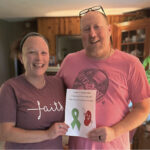Our lives are fast-paced and pressured by our desire to do it all and have it all while doing it perfectly. Overstimulation and multi-tasking distract and exhaust us. The tyrant clock looms dauntingly as we cry, “I don’t have enough time!”
We may well be the rabbit in Alice in Wonderland: “I’m late, I’m late, for a very important date! No time to say hello, goodbye, I’m late, I’m late, I’m late!”Anxiety and blood pressure rise. Where has all the time gone?
Negative stress, called distress, is an elusive and insidious presence that wreaks havoc as we ignore or downplay it. The price we pay is evident as the American Institute of Stress claims that more than 75 percent of patients’ visits to primary care physicians are for stress-related ailments and symptoms. In addition, workplace stress causes 1 million U.S. employees to miss work each day.
Dr. Nicholas Hall, specializing in stress issues, instructs us: “We will always experience stress. The problem is not the stress; the problem in our culture today is that we do not allow for adequate recovery time in our lives.”
While we may not be able to eliminate all stressors, we do have the power to make choices that promote recovery, help us to slow down and prioritize and significantly reduce our symptoms of stress. This is the heart of preventative self-care.
While measures such as eating well and exercise are wise prescriptions for good health, reducing the physical impact of negative stress is best done by consciously and regularly inducing its opposite—the physiological relaxation of both body and mind. Inducing the relaxation response creates an environment through which our body’s natural healing capabilities can restore inner balance. By gifting ourselves the time to stimulate the parasympathetic nervous system, we support the body’s ability to digest, detoxify, eliminate and build immunity. When our system is in balance, we gain clarity of mind, reduce anxiety and pain, act more compassionately, increase our productivity and sleep better. Time becomes our friend. In time, we heal and strengthen our lives.
Here are some suggestions to “do less and have more” in your life. These are, for the most part, “practices.” As such, they offer rich rewards and accumulative benefits when they are practiced consciously and consistently as part of a healthy lifestyle.
Relax the Body and Breathe. The benefits of learning methods for consciously relaxing the entire body and controlling the breath cannot be overstated. One simple but effective technique is to slow down the breath and elongate the exhalation. Inhale slowly (into the belly) to a count of five. Pause the breath for a count of five. Slowly exhale to a count of eight. Take two normal breaths. Repeat the cycle until you feel calm. In third grade, my son was taught this self-management technique by a wise teacher: “Stop, Drop and Breathe.” In other words, reduce future stress by taking time to disengage, relax and think before you act. Priceless.
Practice Mindfulness. Sitting quietly for 20 minutes a day and engaging in a meditative or contemplative means for observing oneself can be transforming. Learning to sit still with greater awareness translates to greater awareness when in motion. Spend less time wasting time feeling drained and tired. Also, learn to slow down daily activities. Doing dishes? Reclaim the art of doing one job well. Listen to the water running, feel the warmth of the water, smell the soap. Use your senses to be fully aware of that moment in time. It may even stimulate an “attitude of gratitude.”
Seek Support from Your Community. Join a yoga, tai chi or relaxation class or find a wellness coach able to help you turn stress relief tips into healthy habits. While it is always critical to see your doctor or medical care provider when health concerns arise, complementary care services such as massage, reflexology or healing touch can provide support through deep relaxation and personalized stress-reducing experiences. Meeting supportive people is an added bonus of this recovery time! And, with holidays around the corner, you can become a stress-relief advocate yourself by giving the gift of a relaxation experience to others.
The clock is not your enemy. It is possible to “make time” as you gain clarity about what is really important in your life. If you really slow down, time will slow down with you, and that ubiquitous clock will become an ally. Instead of panicking—”I don’t have enough time!”—take a deep breath and passionately tell yourself (or wildly chant): “I have all the time I need to do all the things I need to do.”
Then smile, relax and watch your day unfold in a friendlier, healthier way!
Lori Sweet is the owner of Supportive Wellness in the Harrisburg area. A social worker for almost 30 years, she specializes in developing opportunities for promoting stress reduction, mindful relaxation and personal growth. She can be reached at www.supportivewellness.com or bridgetobetterliving@gmail.com.






